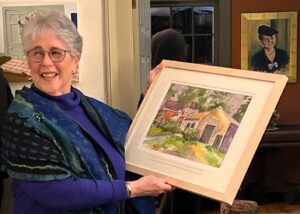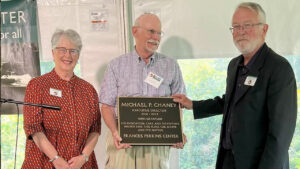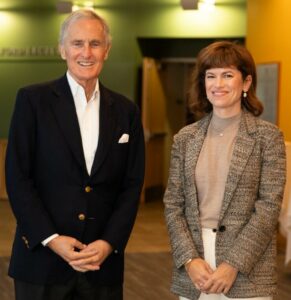This wonderful event is the culmination of a series of happy associations with the Frances Perkins Center that began one early summer morning a number of years ago. As I was strolling down the main street of Damariscotta, a tall, distinguished-looking man approached me. He asked, “Do you know who Frances Perkins is?”
“Well, yes,” I replied. “I’ve actually written about her.” Morrison Bonpasse then invited me into the newly created Francis Perkins Center where I found about a half dozen books, one of them my Franklin D. Roosevelt and the New Deal. A short time later, I was asked to speak at the forthcoming garden party on August 14, and I have done so every summer since. (On one of these occasions, I recounted that when I was teaching at Columbia I was asked by a Mrs. Coggeshall to edit the Perkins oral history memoir there.)
Last year, I had the honor to be on this platform when the Intelligence and Courage Award was presented to the Portland Press Herald columnist, Bill Nemitz, who week after week has brightened this year’s dreadful political scene by the surgical precision with which he has skewered Donald Trump.
Today is the culmination, too, of a relationship to the state of Maine that began precisely seventy years ago when I was the only white on the field staff of a civil rights organization headed by A. Philip Randolph, the architect of the March on Washington. In the winter of 1946, its Washington office had sent me to New England to rally support for a fair employment practices bill. Maine was particularly important because the Republican leader in the United States Senate was from here.
I had no car, but traveled everywhere by train—to Portland, to Brunswick, to Waterville, to Bangor. Subsequently, I lectured at Colby, carried out research at Bates and at the University of Maine in Orono, and spent some months as a visiting professor at Bowdoin teaching constitutional law. For more than thirty years, Jean Anne and I have been coming to Maine each summer—from Swans Island off Acadia to Boothbay Harbor where we now reside.
That first venture to Maine in 1946 set the course of my life — merging the public realm and the university campus. To work in the civil rights organization I had had to take leave from my quest as a graduate student for a Ph.D. in history. Before returning to the university world three years later, I worked in Richard Bolling’s first campaign for Congress in Kansas City, was Rocky Mountain organizer for Americans for Democratic Action (the organization of Eleanor Roosevelt and Reinhold Niebuhr), and served as Massachusetts director of ADA with an office on Beacon Street.
When my teaching career began, the pattern of political involvement continued. As a member of the Smith College faculty in 1950, I managed the Congressional campaign of a woman who headed the CIO Textile Workers in Holyoke, and when I taught at Harvard I accepted an assignment as delegate analyst at the 1952 Democratic convention in Chicago.
For the next thirty years, I taught in the graduate program at Columbia, and during that period I marched in Montgomery with Martin Luther King and wrote the presidential election night analysis for NBC—first for Huntley and Brinkley, then for John Chancellor. During my ensuing twenty years at the University of North Carolina, I was at the CBS anchor desk on Inauguration Day with Bill Moyers, and then Dan Rather and Charles Kuralt.
After the assassination of John F. Kennedy, I served on a committee on oral history headed by Robert Kennedy to supervise recollections of his brother; sued Richard Nixon and Henry Kissinger to prevent their destroying or sequestering public papers; twice addressed the United States Supreme Court; and testified before the U.S. Senate Judiciary Committee against the confirmation of Robert Bork.
For the past thirty-three years, I’ve been historical consultant to Ken Burns. We began when he was still in his twenties with “Huey Long,” only his third film, and have gone on together with “The Civil War,” “National Parks,” “Prohibition,” “The Dust Bowl,” and several others. Recently. PBS showed “The Roosevelts” and “Jackie Robinson.” Two weeks ago today, Jean Anne and I were at breakfast with Ken Burns in his barn in Walpole, New Hampshire, where we go each year for a midsummer jamboree. This time we talked about our collaboration on the film PBS will be screening in 2017: “The Vietnam War.”
I have sought to explain, too, American political institutions to people in other lands—at venues from Great Britain—Scotland, Wales, and England, where I held the Harmsworth chair at Oxford—to The Netherlands, Germany, Italy, and South Africa. At Britain’s Silver Jubilee in 1977, I gave the inaugural address in honor of the Queen at the U.S. Embassy in Grosvenor Square.
On the centennial of France’s gift of the Statue of Liberty to the United States, I spoke in the French Senate, and on the centennial of the birth of Harry Truman, who had taken only eleven minutes to recognize the new state of Israel, I gave the commemorative lecture at the Hebrew University in Jerusalem. In Moscow, I dedicated the first American history institute in Russia, and, more recently, I gave the keynote address on the history of U.S. foreign policy to a gathering of scholars from 27 nations at Schloss Leopoldskron in Salzburg.
My life at the intersection of the campus and the public realm has prompted me to reflect on what that relationship signifies.
The prolific historian Allan Nevins, who I succeeded at Columbia, once asked whether “the political historian who has never testified before a congressional committee, or written a speech for a governor …, or haunted the city hall for a year, is not handicapped as compared with the man who has.” He answered by quoting Macaulay’s remarks on Edward Gibbon, author of the Decline and Fall of the Roman Empire, who had been an officer in the militia and a member of Parliament. “We have not the smallest doubt,” Macaulay wrote, “that [Gibbon’s] campaigns, though he never saw an enemy, and his parliamentary attendance, though he never made a speech, were of far more use to him than years of study … would have been. If the time he spent on parade and at mess in Hampshire, or on the treasury bench … during the storms which overthrew Lord North and Lord Shelburne, had been passed in the Bodleian library, he might have avoided some inaccuracies; he might have enriched his notes with a greater number of references; but he could never have produced so lively a picture of the court, the camp, and the senate house.”
Echoing Macaulay, I am certain that years of political participation have benefited both my writing and my teaching.
But there is a larger question: Are historians obliged to be involved in public affairs? Intellectuals who have been the most engaged in the public realm have often been the most outspoken in warning against that assumption.
The philosopher Charles Frankel, who cared enough about public affairs to take leave from Columbia to become Assistant Secretary of State for Cultural Affairs, nonetheless said, “Scholarship cannot and should not be shackled to problem solving. It must be free to follow crooked paths to unexpected conclusions.”


